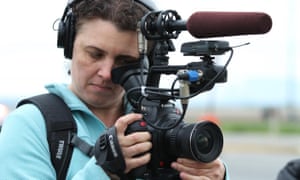Anti-pipeline activists and film-makers face prison, raising fears for free press

Trials begin on Monday in Washington state after actions intended to shut down oil sands pipelines, in solidarity with Standing Rock Sioux tribes efforts

Climate change activists and film-makers who documented their anti-pipeline demonstrations are facing criminal charges and hefty prison sentences, with cases across the US that have raised concerns about press intimidation and the targeting of peaceful protesters.
The slew of upcoming trials, beginning on Monday in Washington state, stem from a series of coordinated actions on 11 October 2016 aimed at shutting down oil sands pipelines. Nine criminal cases include several filed against film-makers and live-streamers who recorded protesters closing the emergency valves on pipelines but did not directly participate in the disruptions.
These activists are responding to a climate emergency, said Steve Liptay, a film-maker facing trespassing and aiding and abetting charges in Minnesota, where he documented protesters shutting down two Enbridge pipelines. As media, we have to tell their stories.
The court cases also in North Dakota, Minnesota and Montana come at a time of increasing anxiety for journalists and activists surrounding the arrest and aggressive prosecution of reporters and protesters critical of US government and powerful corporations.
During protests of Donald Trumps inauguration in Washington DC, at least six journalists and film-makers were charged with felony rioting offenses, which could result in 10 years in prison. One case was later dropped. Lawmakers in multiple states have also recently pursued new laws aimed at restricting protests and making it easier for police to target demonstrators.
The October #ShutItDown protests were organized in solidarity with the Standing Rock Sioux tribes fight against the Dakota Access pipeline. Those demonstrations have also led to serious criminal charges, including a case against radio host Amy Goodman, which a judge eventually rejected.
Two well-known documentary film-makers, who had faced decades in prison for filming the 11 October actions, have since had charges suspended or dismissed. But several activists who live-streamed and filmed the actions, including Liptay, are now preparing for trials alongside five demonstrators who were directly responsible for shutting down pipeline valves. Charges include mischief, criminal damage, trespassing and conspiracy.
If they cant document these stories, then theres something very, very wrong with our idea of press freedom, said Emily Johnston, a protester who is facing two felonies that carry 10-year sentences for targeting a Minnesota pipeline. We have to stand up for that. It has to be absolute.
Sam Jessup, a Vermont activist who live-streamed an action at the TransCanada Keystone pipeline in North Dakota, is facing three felony charges, including two conspiracy allegations that could result in 20-year sentences.
Live-streaming to Facebook is definitely free speech, said Jessup, 31, who said he did not play any direct role in shutting the pipeline. The state will try to intimidate people from standing up and doing what has to be done by throwing the most severe charges at them to try to silence others.
Even when cases against journalists are ultimately dismissed, the initial charges can have a chilling effect.

It was disorienting to realize how helpless I really am as a law-abiding citizen and how much power the system and government agencies can have over me, said Deia Schlosberg, an Emmy-winning film-maker who was originally facing 45 years in prison for filming the TransCanada Keystone action.
The charges were eventually suspended and will be formally dropped later this year, but only if she commits no further crimes, according to Schlosberg. As a result, she said she has been unable to cover certain protests for fear that she could face serious consequences if she were arrested: I feel like I cant fully do my job.
Lindsey Grayzel, the other independent film-maker whose felony case in Washington was ultimately dismissed, said law enforcement still has not returned her memory cards with footage on them, her phone or her notes.
But the ordeal, she said, would not stop her from doing her job.
Its scary, but it makes me more determined than ever that we need to do our work and stand together to get these stories told, Grayzel said.
On Monday, Grayzel plans to film the start of the trial of Ken Ward, the 60-year-old subject of her documentary The Reluctant Radical, who is potentially facing 30 years behind bars for targeting the TransMountain pipeline in Skagit County, Washington, on 11 October.

Ward said the urgency of climate change and governments failure to protect the environment demanded direct actions: Were witnessing the end of conditions that make civilization possible. This is the single most important thing facing the planet. We also happen to be living in a time where no political process allows us to do anything about it.
Richard Mollin, Clearwater County attorney in Minnesota, who is handling the cases of Liptay and Johnston, defended the charges, claiming that neither was likely to spend more than a year behind bars if convicted.
He may have been filming, he said of Liptay, [but] the fact that he was there and had trespassed on the property is the basis for which the charge was made.
Lauren Regan, executive director of the Civil Liberties Defense Center and Wards attorney, said it was clear that oil companies and government officials were trying to deter these kinds of protest actions.
It is not surprising that they are attempting to come down on these individuals with the full power of the state.